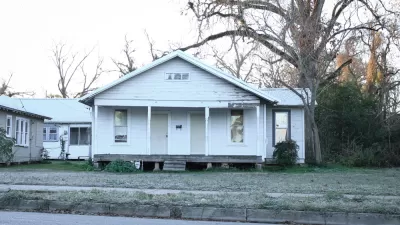A new White House policy to reduce homelessness seeks to address the root issues that cause people to lose housing and stimulate housing production.

Writing for NPR, Jennifer Ludden reports on the Biden administration’s new plan to address the nation’s homelessness crisis. As Ludden explains, while hundreds of thousands of unhoused Americans have moved into housing in the last five years, roughly the same number have become homeless in the same period, canceling out any progress. “Over the course of this year, more than a million individuals and families were without housing at some point, and they were disproportionately people of color, a disparity the plan aims to address.”
The White House plan calls for a 25 percent reduction in the number of unsheltered people in the next three years. “The new plan includes a range of ways to boost the supply of affordable housing, as well as increase the number of emergency shelters and support programs. But its biggest change is a call for the ‘systematic prevention of homelessness,’ focusing on those who are struggling to keep them from losing their housing.”
The policy signals a shift toward addressing the root causes of homelessness and developing interventions that help people stay in their homes. In San Diego, a pilot program subsidizes rent for low—income seniors and others, distributing relatively small amounts of money—up to $500—that can make a crucial difference for households struggling to keep up with rent.
The article describes other programs designed to identify people at risk for losing their housing and providing assistance early on. Advocates say this not only helps keep people housed, but reduces the cost of interventions.
Meanwhile, the policy acknowledges the impact of the country’s housing shortage. “Among many other things, the Biden administration's plan on homelessness includes ongoing efforts to make it easier to use federal tax credits to build low income housing, and encourages communities to rezone for denser development.”
FULL STORY: It is the obvious thing.' The White House tries a new tack to combat homelessness

Alabama: Trump Terminates Settlements for Black Communities Harmed By Raw Sewage
Trump deemed the landmark civil rights agreement “illegal DEI and environmental justice policy.”

Planetizen Federal Action Tracker
A weekly monitor of how Trump’s orders and actions are impacting planners and planning in America.

The 120 Year Old Tiny Home Villages That Sheltered San Francisco’s Earthquake Refugees
More than a century ago, San Francisco mobilized to house thousands of residents displaced by the 1906 earthquake. Could their strategy offer a model for the present?

In Both Crashes and Crime, Public Transportation is Far Safer than Driving
Contrary to popular assumptions, public transportation has far lower crash and crime rates than automobile travel. For safer communities, improve and encourage transit travel.

Report: Zoning Reforms Should Complement Nashville’s Ambitious Transit Plan
Without reform, restrictive zoning codes will limit the impact of the city’s planned transit expansion and could exclude some of the residents who depend on transit the most.

Judge Orders Release of Frozen IRA, IIJA Funding
The decision is a victory for environmental groups who charged that freezing funds for critical infrastructure and disaster response programs caused “real and irreparable harm” to communities.
Urban Design for Planners 1: Software Tools
This six-course series explores essential urban design concepts using open source software and equips planners with the tools they need to participate fully in the urban design process.
Planning for Universal Design
Learn the tools for implementing Universal Design in planning regulations.
Clanton & Associates, Inc.
Jessamine County Fiscal Court
Institute for Housing and Urban Development Studies (IHS)
City of Grandview
Harvard GSD Executive Education
Toledo-Lucas County Plan Commissions
Salt Lake City
NYU Wagner Graduate School of Public Service





























